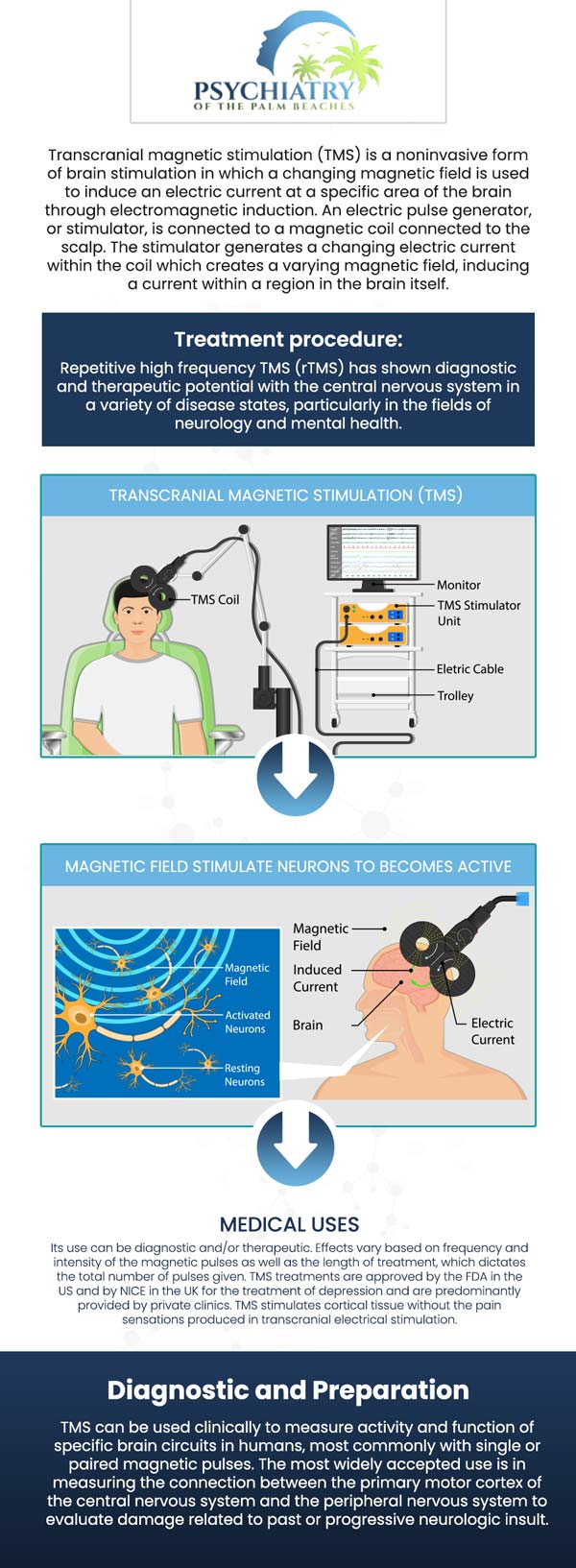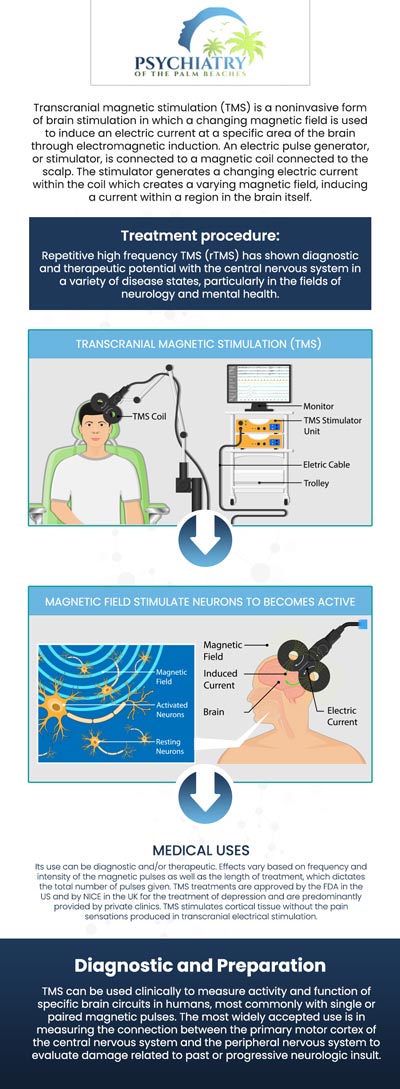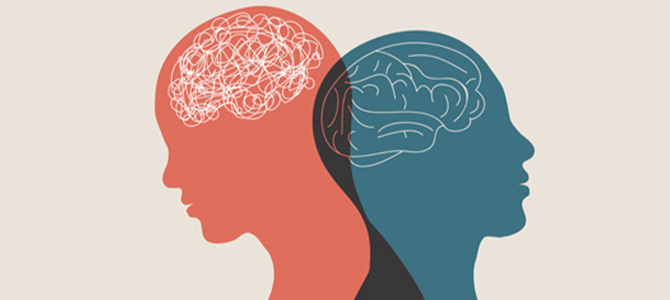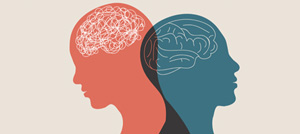How Does TMS Therapy Help Patients in Jupiter, FL
Transcranial magnetic stimulation (TMS) is a non-invasive therapy procedure that includes applying a magnetic field that regulates your brain’s electrical activity. Depression, obsessive-compulsive disorder, smoking cessation, and migraines can all benefit from this treatment. It has benefited those who have not responded to medication for depression or psychotherapy. For more information, contact us today or book an appointment online. We are conveniently located at 3893 Military Trail Suite 3 Jupiter, FL 33458.




Table of Contents:
What exactly does TMS do to the brain?
What can a patient expect from TMS?
What are the results of TMS therapy?
What are the pros and cons of TMS?
Transcranial Magnetic Stimulation (TMS) is a modern and non-invasive treatment for major depression. It uses a special coil to create strong magnetic fields that precisely target a specific area in the brain responsible for mood regulation.
These magnetic fields induce small electrical currents in the brain, activating certain cells. These activated cells release neurotransmitters like serotonin, norepinephrine, and dopamine, which help restore the chemical balance associated with depression. Although changes in brain excitability can occur after a single session, noticeable relief from symptoms usually takes at least three weeks of consistent treatment. While TMS is primarily used in the treatment of major depression, under certain circumstances it may be considered as part of an off-label treatment for anxiety, bipolar disorder, post-traumatic stress disorder, and more.
TMS will typically be used alongside talk therapy, such as cognitive behavioral therapy (CBT) as part of a more comprehensive treatment plan for major depression. TMS will typically be considered in instances where frontline medications prove ineffective in the management of their condition.
TMS is a simple outpatient procedure that lasts about 20 minutes per session. During the procedure, a magnetic coil is placed on the head to create a magnetic field, generating an electrical current in the brain. This current activates specific neurons that may not have been active before, causing the release of more neurotransmitters. Neurotransmitters help neurons communicate and form pathways in different parts of the brain.
With TMS, neurons in the left dorsolateral prefrontal cortex are activated, influencing the mood pathway and regulating mood. TMS uses short pulses of magnetic energy to stimulate nerve cells, affecting the brain’s electrical activity linked to emotions. The prefrontal cortex, associated with mood disorders, is the main focus of TMS. The procedure is painless and non-invasive and allows patients to go about their daily activities before and after each treatment.
Depression is a chronic condition, and as a result, ongoing TMS therapy is typically necessary for sustained results. However, patients can typically experience long-term relief. Patients often report positive mood changes within a few TMS sessions, although comprehensive benefits are observed upon completing the recommended 4 to 6-week treatment course. The duration of TMS results varies among individuals and is influenced by unique factors contributing to depression. Individuals adhering to the entire treatment regimen commonly experience symptom improvement lasting six months to a year or more.
Repetitive TMS may be recommended when conventional treatments prove ineffective, requiring daily sessions over 4 to 6 weeks. While symptom relief may take a few weeks, TMS remains a viable option for individuals seeking non-invasive alternatives. The procedure is non-addictive, allowing patients to continue with their daily activities without disruption. TMS stands as a highly impactful intervention for individuals resistant to traditional depression treatments.
The advantages of TMS are underscored by its non-invasive nature, sparing patients from the side effects associated with medications or surgery. The therapy specifically targets the prefrontal cortex, associated with mood disorders, making it a focused and effective intervention. TMS boasts a two-thirds response rate, surpassing the response rate of classical antidepressants. However, it is not without drawbacks.
The financial aspect can be a concern, though most insurance companies cover TMS as a medical necessity for depression treatment. The commitment required for the full treatment course, spanning five sessions per week for four to six weeks, may pose a challenge.
Despite the cost and time considerations, TMS remains a highly effective treatment option for individuals seeking alternative approaches to managing depression, particularly when frontline methods have proved ineffective.
TMS stimulates the activity of nerve cells in the brain, which may aid in the treatment of depression. It may also be beneficial for OCD, anxiety, and PTSD. If you are suffering from depression or any other mental health condition, visit us at Psychiatry of the Palm Beaches.
Holistic Care Through Our General Psychiatry Services—With Our Team
General psychiatric care at Psychiatry of the Palm Beaches focuses on the whole person—mind, body, and lifestyle. Our team provides thorough assessments and customized treatment plans that address emotional, cognitive, and behavioral needs. Whether a patient is dealing with mood disorders, anxiety, stress, or life transitions, our team ensures they receive thoughtful, integrated care. Our goal is to help every individual achieve sustained mental wellness and a more balanced life.
For more information or to begin your journey towards healing, contact us or book an appointment online. Together, we can work towards achieving a state of well-being and happiness in your life. We are conveniently located at 3893 Military Trail Suite 3 Jupiter, FL 33458. We serve patients from Jupiter FL, North Palm Beach FL, Riviera Beach FL, West Palm Beach FL, and surrounding areas.
Check Out Our 5 Star Reviews



Additional Services You May Need
▸ Mental Wellness
▸ Relationship Coaching
▸ Depression and Mood Disorders
▸ Women’s Health
▸ Panic Disorder
▸ Medications Management
▸ Men’s Health
▸ Individual Psychotherapy
▸ Bipolar
▸ ADHD
▸ Geriatric Mental Health
▸ Couple’s Counseling
▸ Obsessive Compulsive Disorder
▸ Social Phobia Treatment
▸ Eating Disorders
▸ Post Traumatic Stress Disorder
▸ Psychotic Disorders


